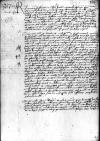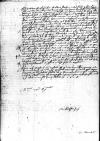Scribo aliquando serenissimae ⌊regiae⌋ et ⌊reginali maiestati⌋ et praetereo Dominationem Vestram Reverendissimam, quod numquam solet accidere, nisi cum postae celerius abeunt, quo me scribendi tempus deficit. Qua de re Dominationem Vestram Reverendissimam summopere rogo, non velit hoc aliter, atque accidere solet, interpretari. Nihil enim in observantia, quam Dominationi Vestrae Reverendissimae iure merito debeo, decrevit, sed in dies crescit, mallemque eam coram, quam litteris exhibere et agere cum Dominatione Vestra Reverendissima sub nostro caelo, quam in his hic ardoribus torreri, sed
cf. Pub. com. 17.14.4 malum est consilium, quod mutari non potest and feras, non culpes, quod vitari non potest. ⌊ferendum est, quod mutari nequitcf. Pub. com. 17.14.4 malum est consilium, quod mutari non potest and feras, non culpes, quod vitari non potest. ⌋.
Cum me ante quattuor annos Dominatio Vestra Reverendissima a se dimitteret, memini, quod non erat nobis ea opinio, ne somnium quidem, quod tam diu hic deberem immorari. Erat mihi aliud vitae institutum, iam enim me omnis aulica ambitio, quae prius etiam mihi non magna fuit, deseruerat et inglorius, quod aevi reliquum fuit, intra privatos parietes transigere proposueram. Intervenit haec mora,
cf. Ov. Met. 1. 366 sic visum superis hominumque exempla manemus ⌊sic visum est superiscf. Ov. Met. 1. 366 sic visum superis hominumque exempla manemus ⌋, in qua Dominationi Vestrae Reverendissimae pro tot in me collatis beneficiis non potui servire, ut volui et debui. Quae cum mecum reputo, quod fit saepius, non possum in animo non affligi et reor esse hanc inter alias potissimam meam afflictionem, qua hic plerumque vivens mihi mori videor. Quocirca, ne omnia, quae in his scribi possent, persequar, Dominationi Vestrae Reverendissimae humiliter supplico, si cum gratia ⌊principum⌋ nostrorum fieri potest, in quorum arbitrium me totum reposui, efficiat bonis modis, ut iam tum demum aliquando ex hoc exilio revocer, quandoquidem omnia fere, quae ⌊maiestas reginalis⌋ desideravit, magna cura et labore meo sunt expedita, praeter adoham, in qua adhuc ⌊caesar⌋ se continet et nescio qua de re mentem suam declarare gravatur. Est tamen adhuc mihi spes, si dominus ⌊Cornelius Scepperus⌋ bene apud vos habitus huc redierit, quod tandem duritiam ea in re ⌊caesaris paper damaged⌈[s]s paper damaged⌉⌋ expugnabimus. Dominus ⌊cancellarius⌋ me adhuc consolatur et bene spe paper damaged⌈[e]e paper damaged⌉rare iubet, cuius integritati plurimum fido et iam plura, quam prius paper damaged⌈[ius]ius paper damaged⌉ umquam, potest apud ⌊caesarem⌋. A me nihil omittetur, quo et haec paper damaged⌈[c]c paper damaged⌉ possit expediri et ego quantocius revocari, ad quod, ut spero, Dominatio Vestra Reverendissima pro sua in me gratia suum efficax praestabit paper damaged⌈[t]t paper damaged⌉ adminiculum.
De duello istorum ⌊regum⌋ et alia omnia, quae hucusque hic sunt paper damaged⌈[nt]nt paper damaged⌉ acta, satis abunde pro istorum temporum qualitate ad ⌊maiestatem regiam⌋ ⌊⌋, inde Dominatio Vestra Reverendissima intelliget omnia. Incidimus in miserrima tempora, in quibus virtus, fides et religio passim ubique periclitantur. Plaga Dei est.
 BNW, BOZ, 2053, TG 8, No. 958, p. 183v
Hic habita est aliquamdiu de libris ⌊Erasmi⌋ inter ⌊fratres⌋, qui se religiosos vocant, et inter doctiores aliquos, quos dicunt saeculares, non parva contentio; superavit tamen sanior pars. Libri ⌊Erasmi⌋ multi traducti sunt in linguam Hispanam legunturque passim abstuleruntque hic non parum superstitionis. Vereor, ne quid tale hic accidat, aut peius, quam in ⌊Germania⌋. Coegerunt omnes ⌊Mauros⌋, qui hucusque fuerunt Mahometici, ad fidem Christi. Est illorum magnus numerus tam circa ⌊Valentiam⌋ quam etiam hic circa ⌊Caesar Augustam⌋, sunt praeterea multi ⌊Iudaei⌋ Christum, ne bona sua perderent, hic professi, cum ⌊rex Ferdinandus Hispaniae⌋ avus maternus ⌊caesaris⌋ eos hinc expelleret. Sunt item alii Christiani mali plurimi, qui si quippiam libertatis nacti fuerint contra inquisitores, penitus hic de religione actum erit. Aveo scire, quomodo se ⌊conterranei⌋ et ⌊gentiles⌋ mei post istam castigationem a ⌊maiestate regia⌋ habitam gerant in ecclesia. Ad me huc nihil perscribitur. Proinde rogo maximopere, iubeat aliquando Dominatio Vestra Reverendissima ad me scribi denturque litterae in manus ⌊Georgii Hegel⌋, is per ⌊Antverpiam⌋ commode eas ad me transmittere poterit, accumuletque hoc beneficium ad alia mihi praestita, quo me sibi devinctiorem et post mortem ⌊patris⌋ mei non vulgariter consolatum reddet.
BNW, BOZ, 2053, TG 8, No. 958, p. 183v
Hic habita est aliquamdiu de libris ⌊Erasmi⌋ inter ⌊fratres⌋, qui se religiosos vocant, et inter doctiores aliquos, quos dicunt saeculares, non parva contentio; superavit tamen sanior pars. Libri ⌊Erasmi⌋ multi traducti sunt in linguam Hispanam legunturque passim abstuleruntque hic non parum superstitionis. Vereor, ne quid tale hic accidat, aut peius, quam in ⌊Germania⌋. Coegerunt omnes ⌊Mauros⌋, qui hucusque fuerunt Mahometici, ad fidem Christi. Est illorum magnus numerus tam circa ⌊Valentiam⌋ quam etiam hic circa ⌊Caesar Augustam⌋, sunt praeterea multi ⌊Iudaei⌋ Christum, ne bona sua perderent, hic professi, cum ⌊rex Ferdinandus Hispaniae⌋ avus maternus ⌊caesaris⌋ eos hinc expelleret. Sunt item alii Christiani mali plurimi, qui si quippiam libertatis nacti fuerint contra inquisitores, penitus hic de religione actum erit. Aveo scire, quomodo se ⌊conterranei⌋ et ⌊gentiles⌋ mei post istam castigationem a ⌊maiestate regia⌋ habitam gerant in ecclesia. Ad me huc nihil perscribitur. Proinde rogo maximopere, iubeat aliquando Dominatio Vestra Reverendissima ad me scribi denturque litterae in manus ⌊Georgii Hegel⌋, is per ⌊Antverpiam⌋ commode eas ad me transmittere poterit, accumuletque hoc beneficium ad alia mihi praestita, quo me sibi devinctiorem et post mortem ⌊patris⌋ mei non vulgariter consolatum reddet.
In Augusto futuro annus transibit, cum novissime a ⌊maiestate regia⌋ et a Dominatione Vestra Reverendissima novissimas litteras viderim. Nescit Dominatio Vestra Reverendissima, quantum gaudium est exulibus, cum ab his litteris consolantur, a quibus missi sunt in exilium.
Alia ad praesens non restant, quam quod me humillime gratiae et benevolentiae Dominationis Vestrae Reverendissimae commendo. Deus Optimus Maximus faxit, ut eam salvam, felicem et in primatu brevi apud nostros videam.
 BNW, BOZ, 2053, TG 8, No. 958, p. 184r
BNW, BOZ, 2053, TG 8, No. 958, p. 184r
 BNW, BOZ, 2053, TG 8, No. 958, p. 183r
BNW, BOZ, 2053, TG 8, No. 958, p. 183r
 BNW, BOZ, 2053, TG 8, No. 958, p. 183v
Hic habita est aliquamdiu de libris
BNW, BOZ, 2053, TG 8, No. 958, p. 183v
Hic habita est aliquamdiu de libris 

